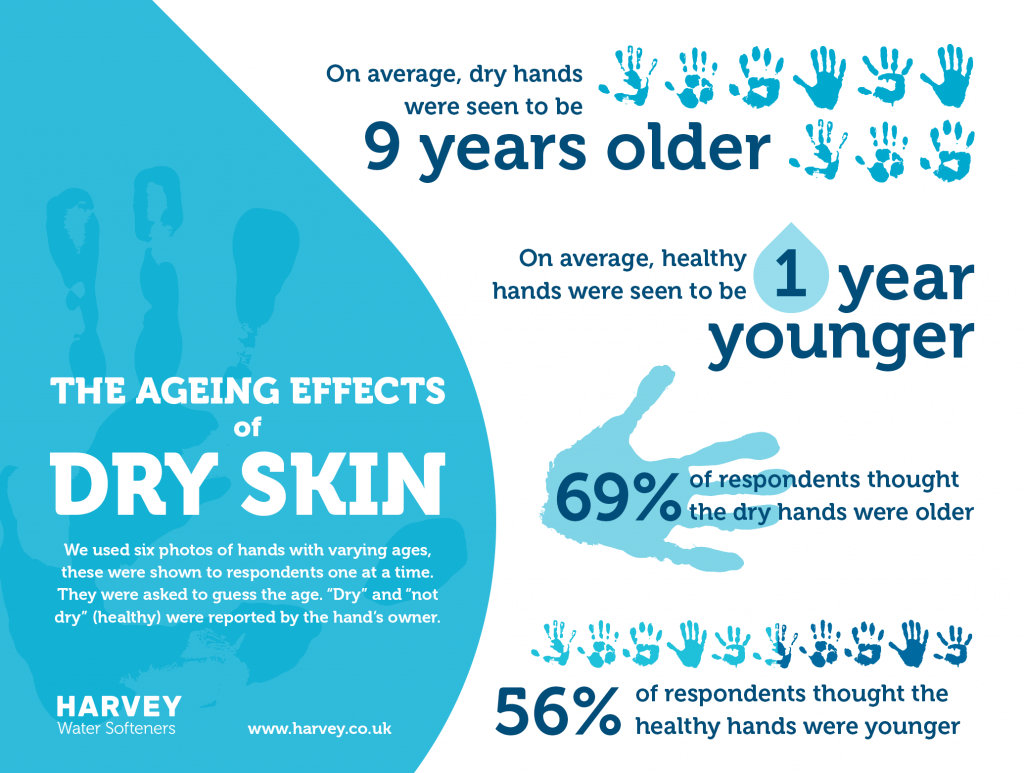
Revealed: The dry skin problem ageing you prematurely
Skin Care
Like all of you out there, we’re accepting of the necessity of washing our hands to keep us safe, to protect our loved ones and to keep us healthy.
But we’re also acutely aware of the effect that excessive hand washing is having on our skin health. Here, we’ll explore what’s causing your dry skin and reveal the hidden impact of dry skin that’s ageing you prematurely…
Why are my hands so dry?
If you’ve been washing your hands a lot more frequently and for more time than you did pre-lockdown, it’s highly likely you’re noticing the skin on your hands looks and feels a lot more dry. Maybe it’s flaky, itchy, perhaps it’s even sore and moving into the realms of eczema or psoriasis.
It’s perfectly normal that your hands are feeling this way.
That’s because your skin is covered by a protective layer composed of oils that form a natural barrier against things that might cause our skin hard, and which help to keep moisture in. When we wash more frequently, we break down that protective layer and allow our skin to be more exposed to the elements that affect its health.
That’s true for everyone, but there are certain areas in the country where this dryness is going to be more prevalent.
For example, those of you living in the South East of the UK are likely to find your skin is much drier than those living in the North. That’s because the quality of water differs across the country; for those in the South, water is what we call ‘hard’, which means it contains higher levels of magnesium and calcium than areas with ‘soft’ water, or homes that have invested in softening their water with a water softener.
For those living in hard water areas, you’ll find the protective barrier on your skin breaks down more quickly and the effects are more harsh because of that hardness. The excess of minerals in the water ‘attacks’ the barrier much faster than water with lower levels of those composites.
Want to know more? Check out this study from the Journal of Investigative Dermatology which explores the effect of hard water on your skin in more detail, or take our water quality test to find out more about the quality of your water.
The unspoken impact of dry hands
Dry hands are normal. In this ‘new normal’, where hand washing is more important than ever, dry hands are going to become even more common.
Something you might not have realised about dry hands is that they can age you prematurely. In a study looking at the impact of dry hand skin, the research team at Harvey Water Softeners made the surprising finding that having dry hands ages you by 9 years on average.
You’ll be estimated to be 9 years old than you actually are if you have dry hands.
Meanwhile, those people with healthy hands were, on average, estimated to be one year younger than their actual age.
Having dry hands ages you. Having healthy hands makes you look younger.
The findings of our study are summarised below:
Methodology and findings
We invited a selection of people to share photos of their hands with us. Nothing else, just their hands. We then asked them to tell us if they considered their hands to be dry or healthy.
Of the photos, half were of dry hands and half were of healthy hands. That was step one.
The next step was to invite an audience of 1,000 respondents to estimate the age of the hands’ owners by looking at nothing but the photos of their hands.
When looking at dry hands, we found:
- Only 5% of respondents guessed the correct age
- 69% guessed higher than their actual age
- 26% guessed lower than their actual age
The biggest difference when looking at dry hands was 52 years, with a 28 year old guessed to be 80 years old by two of our respondents.
When looking at healthy hands, we found:
- 56% of respondents guessed lower than their actual age
- 15% guessed the correct age
- 30% guessed higher than their actual age
The biggest difference when looking at healthy hands was 27 years, with two respondents guessing a 33 year old to be just 6 years old based on their hands alone.
Caring for dry hands
Having dry hands is, at best, an irritation and, at worst, a painful condition. At one end of the scale, we might feel discomfort and itching in our dry skin. At the other, we experience the crippling pain of extreme eczema or psoriasis. And there’s a whole spectrum in between.
The medical impact of dry skin is real. If you are experiencing pain from dry skin, it’s important to reach out to a medical professional who can help.
If your hands are uncomfortable but manageable, there are steps you can take to relieve that discomfort. The following tips to protect and treat your hands have been collated with the help of medical experts:
1. Use warm water, not hot
Washing your hands is important, but you’ll get the same effect with lukewarm water that you will from very hot water – except the latter is much more likely to dry your hands out.
Try washing with lukewarm water instead of hot. Thank you to Lucy Xu, skin specialist and founder of London Premier Laser and Skin Clinics for this tip.
2. Use moisturising soap
Choosing a moisturising soap can really benefit your hands when you’re washing them more frequently.
Broadly speaking, bar soaps tend to have naturally higher pH levels due to the components that hold them together, and can therefore be more drying, while liquid soaps tend to provide better moisture. If you can find a bar soap that is moisturising, that’s the ideal, because they tend to be better for the environment.
Try these vegan soap bar options from Faith In Nature for something environmentally friendly and kind to your skin.
3. Avoid abrasive hand drying
Drying your hands after washing is important, because wet hands spread germs more easily than those which have been well dried.
However, the micro-abrasions you get from scrubbing your hands dry can damage that skin’s protective layer, too.
Try to ‘blot’ the skin dry rather than rubbing it.
“Paper towels are best, but if you use cloth, each person in a home should have their own towel and towels should be replaced with clean ones every 3 days. Make sure hands are thoroughly dried, as germs are more easily transferred on wet hands,” explained Renée Rouleau, skin care expert and aesthetician.
4. Stop dry skin at the source
As noted earlier, the quality of your water will have an impact on the dryness of your hand skin.
For anyone living in an area with hard water, the likelihood is that your hands will feel much more dry, as the excessive levels of magnesium and calcium damage your skin’s protective layer.
Meanwhile, those people living in a soft water area will find their skin is more healthy because the protective layer is less likely to be broken down, or is, at least, broken down less quickly.If you are in a hard water area, all is not lost – you can change the quality of your water by investing in a water softener. Find out more about our water softeners here.





